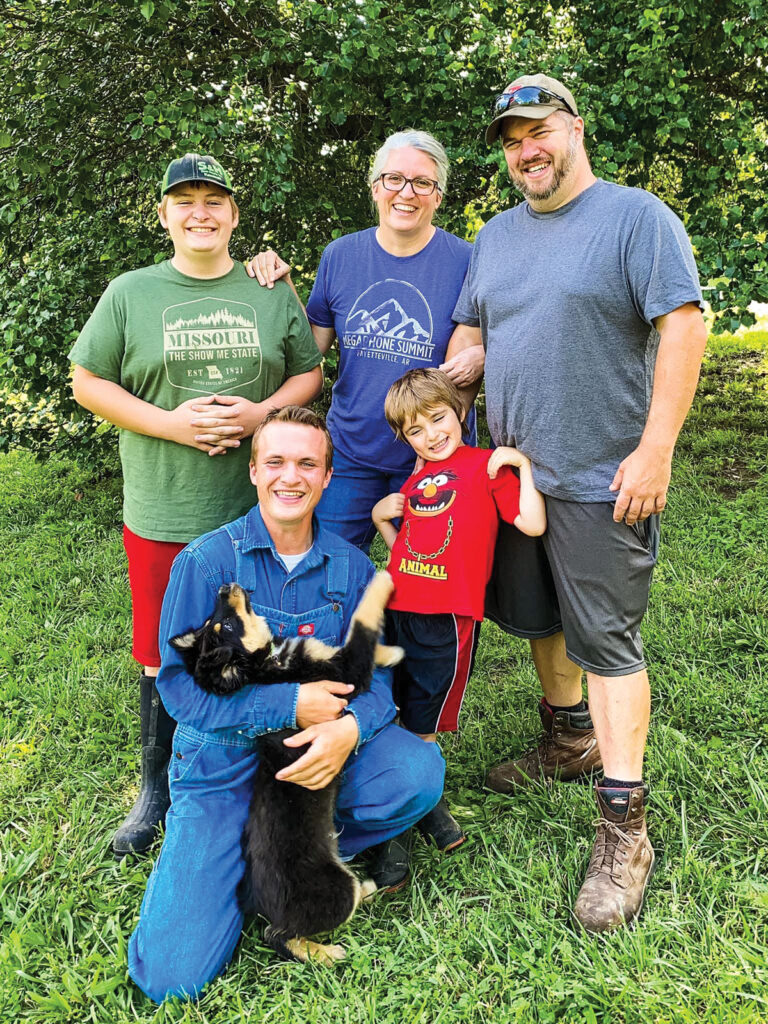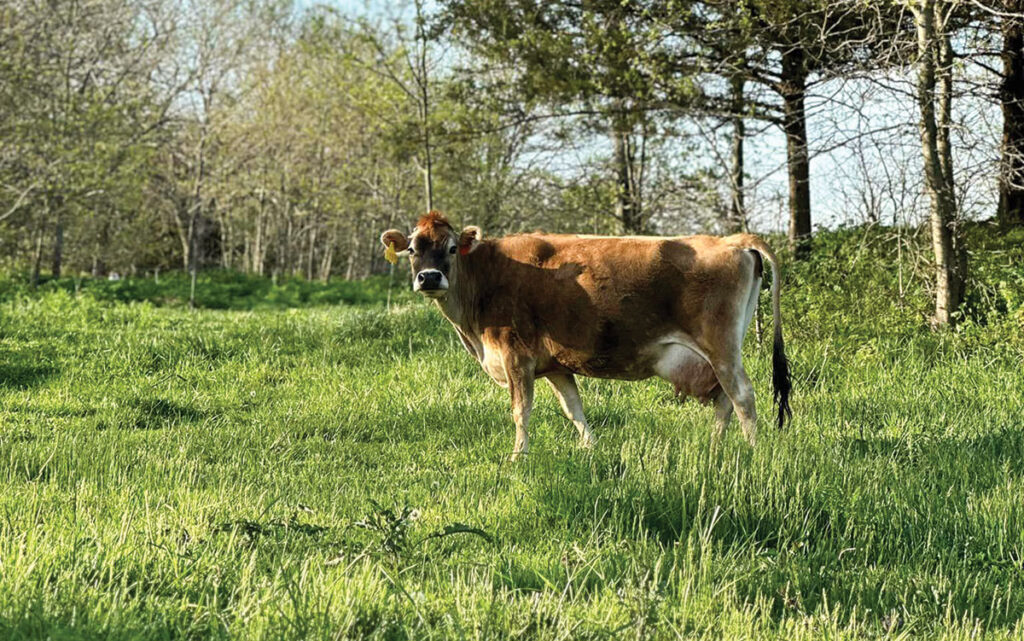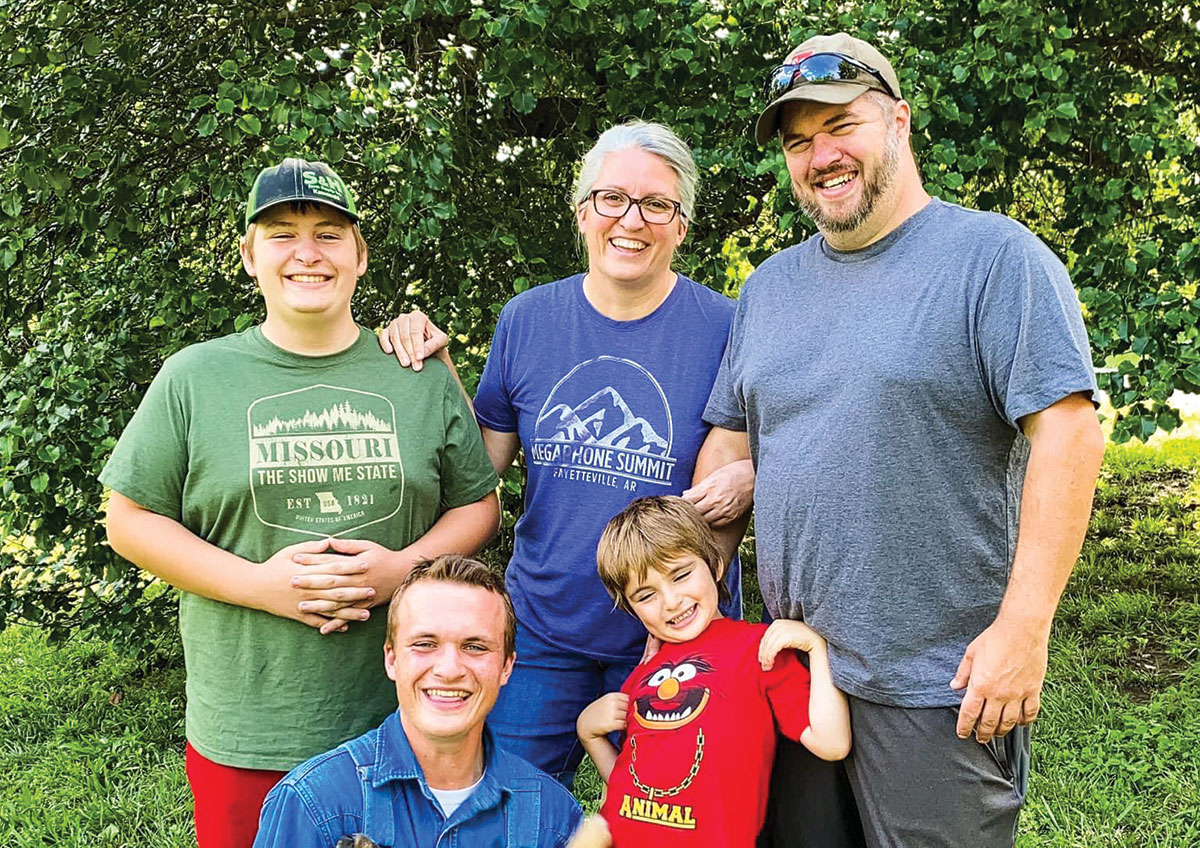
Bonny Vale Farm is a growing micro-dairy focuses on A2/A2 gene-producing cattle
MOUNTAIN GROVE, MO. – The Missouri Ozarks is historically known for its contributions to the dairy industry but numbers have been in rapid decline in the last several decades.
For some farmers, however, the dairy industry is climbing back in a different way: micro-dairies. Instead of huge operations all over the countryside, there are a growing number of micro-dairy farmers growing small herds. Some of these, like Bonny Vale Farm near Mountain Grove, are situated on what used to be large century dairy farms that had been abandoned for one reason or another.
Owners Dan and Melissa Lockcuff purchased their farm in 2020 and until recently, it was known simply as Lockcuff Family Farm. They live there with their three sons, all whom help in some way around their farm. Their oldest, Jacob, is 21 years old and manages a market garden grown on the farm. Dan and Melissa manage the chickens and cattle, which includes both beef and dairy cattle. They recently renamed the farm Bonny Vale Farm to honor the beautiful valley they live in, as well as pay homage to their family history.
“This used to be a really big dairy community,” Dan said. “There’s a lot of history here. We have two farms next to us that are century farms and they were both dairies.
“Micro-dairies are coming back and are popping up on these farms,” he concluded.
The original farm on their land can be dated back to the 1800s; the original deed was signed by Abraham Lincoln.
“It’s been a dairy farm for most of its life,” Dan said of the land.
A family who was friends with Melissa’s family had owned the farm since the 1970s until they sold it in 2005. Two families owned it after that before the Lockcuffs purchased it in 2020. The home and buildings, many of which were built in the early 1900s, were in total disrepair and the land had to be cleared.
Dan and Jacob moved to the property in October 2020 to start clearing and doing major renovations. Melissa and the rest of the family joined them in November. At first, they were living in a camper on the property while they built an add-on to the garage to live in while they take their time rebuilding the house. The family was delighted to be able to have a simple Christmas meal in their new home.
By the spring of 2021, they already had some bottle-fed calves and some chickens, and Jacob had started the garden. What is now known as Bonny Vale Farm has about 110 chickens of a wide variety of breeds, a beef herd of 16 head including South Poll, Corriente, and Dexter. They have two Jersey dairy cows, which they purchased specifically for the A2/A2 gene. They also have Jacob’s produce and have started an orchard.
Melissa and Dan’s interest in having an A2-gene exclusive farm started with their interest in raw milk.
“I had a doctor who wanted me to go off all dairy (for digestive issues) but I thought that there had to be a better way,” Melissa said. “There was a north Missouri farm that talked about raising cattle with the A2 protein and the more I researched it, I started buying it in the store. I saw I did OK with it and we decided to buy our own cow (to have our own milk).”
The original plan was to hand milk the one cow for the family; they were already starting to drink raw milk for Dan and their three sons. Melissa, who is also a digital content creator, operates a food blog that, along with their adventures, also includes a variety of recipes. She realized her audience would enjoy recipes that included raw milk, especially ice cream.
Between those requests and her need for the A2 protein, the family decided to make that part of their farm and they sell the raw milk to a growing number of customers in the area. And, Melissa is incorporating the raw milk into even more recipes for her two food blogs and her YouTube channel. She also incorporates other ingredients they grow and sell on the farm including farm-fresh eggs and produce.
“It’s doing well so far,” she said.
Dan, who also has his own business providing WordPress site hosting and management, agreed her recipes involving raw milk and other farm ingredients are increasingly popular.

“People want the food from their grandmothers. They want that comfort food,” he said.
The family did research on what breeds of cattle they needed for their specific needs and also learned much from more experienced farmers to decide on their farm management practices including what they feed to how they rotate their crops and livestock. Some of their ideas also came from what they witnessed when they were young.
“My ancestors were farmers and I grew up near dairies. Some of the farmers gave their dairy cows limited access to the pasture, and I always thought there was a better way to manage them,” Dan said, adding that they’ve spent time learning how to move the cattle in a way that not only feeds them well but also helps regenerate the soil and provides a higher quality pasture for the animals
“We look at our animals as partners on our the farm,” Melissa said. “We use regenerative practices to build the soil life which helps to grow a variety of native grasses.”
The chickens are pastured and free-range. They also eat a custom blend of layer feed and feed eggs. The beef cattle are all grass-fed and moved around the different fields. The dairy cattle are also grass-fed and moved to various pastures and paddocks in rotation. They are fed a custom grain blend when in the milking parlor.
The cattle are rotated between paddocks and the process keeps the animals well-fed and they in turn help fertilize the land.
“We let them mow the grass and they fertilize it,” Dan said.
The practice also helps them avoid a lot of parasites while at the same time bringing back other necessary nutrients and components of the farm ecosystem.
“We had no dung beetles,” Dan said. “Now with this method, they are back in astronomical amounts. We’re bringing back the ground the way God made it to be.”
Their chickens, which follow the cattle in rotation, don’t seem to eat the dung beetles, but they do eat other pesty bugs. The family does not need to use pesticides, making the farm even more natural.
Bonny Vale Farm’s future includes growing the dairy herd; they are now milked with a vacuum-operated bucket milker, and renovating more of the farm’s old buildings.
“Right now we’re milking under a lean-to while we’re renovating the original milk barn,” Dan said.
They already follow the standards from the Raw Milk Institute and are working to become certified for their clean handling practices, Dan said.







